There is a high probability that properly insulating your home is more crucial than you can ever think. Insulation can help you create a comfortable and healthy living environment while also saving you money on your power bill by limiting the movement of heat into and out of your living space. Consult the complete information guide about insulation to learn more about it and appreciate the many benefits that it offers.
Insulation Benefits
Insulation, as previously said, provides a slew of appealing advantages to homeowners. The following are some of the benefits of insulation
- Reduces energy costs
- Reduces the risk of mold and pest infestations
- Noise pollution is greatly reduced.
- Increases the value of your home
What Does R-Value Represent?
The R-value of an insulation type is one of its most essential features. The ability of insulation to resist the conductive flow of heat is measured by its R-value. You may obtain a fair notion of how successful an insulation material would be if you understand R-values.
Insulation materials with greater R-values resist heat flow better and function as better insulators. The thickness of the home insulation, how the insulation was laid, the density, the material age, and the temperature or moisture level in an area all influence the R-value of a material.
The R-value of various insulating materials decreases with time. However, some materials, such as spray foam, retain their R-value.
The Most Important Areas To Insulate In Your House
Right From your gallery to your flooring, insulation may be installed practically in any of the places of your home. While homeowners can really gain from adding insulation in any of these sites, there are a handful of spaces that are particularly critical.
Insulating your attic, for instance, can assist keep heat from escaping or entering via the roof. If you dwell in any location that gets really cold and gets a lot of snowfall it’s very important to insulate your attic. A properly insulated attic will help prevent severe ice dams from accumulating on one’s roof, which can result in collapsing sometimes.
Insulation in the ceilings and floors of one’s home is also quite advantageous. Insulating your ceiling and floor will assist prevent air transmission between your home’s different buildings. Furthermore, carefully protecting your ceiling and floor will assist to limit noise transfer, resulting in a quieter environment.
The walls of your home are another critical area where insulation should be installed. Around 35% of heat is lost through the walls in an under-insulated home. Your walls must be adequately insulated to ward off such a large amount of heat from escaping your home.
How Often Should Your Insulation Be Replaced?
Nearly 70% of homes today are under-insulated due to a failure to timely replace insulation. While some forms of insulation can last for a long time, you’ll eventually need to replace your insulation. Insulation might lose its effectiveness over the advent of time. When the quality of your insulation starts worsening, your home is more likely to grow molds, generate ice dams, become infested with pests, and allow draughts that cause your energy bill to skyrocket. It’s critical to upgrade your insulation if you wish to maintain its functioning properly.
The frequency required to update your home’s insulation is determined by several factors, including the insulation type, installment pattern, and the environment in which it is situated. Home insulation can last from 15 years to nearly 100 years. Drafts, drastic temperature swings in every room, high energy bills, dampness in the windows, and increased allergy symptoms are all common signals that your insulation needs to be replaced at the earliest.
The Dangers Of Do-It-Yourself Insulation
Many people attempt to save chunks of money by installing their insulation in their homes all by themselves. However, ignoring professional advice could cost them in the long run. Before determining whether to install insulation all by yourself or hire a professional contractor, you must first understand the consequences of improper installation.
- Property damage due to self-insulation installation
If you attempt to put insulation in your home without the necessary training, you definitely risk damaging your home. You risk obstructing airflow by putting insulation in the wrong place, which could lead to mold breakouts due to moisture buildup. Not only this, Ice dams could form on one’s roof as a result of improperly constructed insulation.
- Insulation installation on your own poses a safety concern.
When you install insulation around combustible sources like electrical wiring, you’re putting yourself at risk of fire and electrocution. Furthermore, if you tread in the wrong places while installing insulation in your attic, you run the chance of falling.
- Insulation that has been improperly installed poses a health danger
An ardent attempt to install your own insulation carries various health dangers in addition to the potential for damage to your property. Proper installation might result in dangerous gassing of chemicals, which can raise inhabitants’ risk of causing respiratory difficulties or some types of cancer, depending on the insulating agent employed. Additionally, attempting to install insulation on your own may cause severe irritation to your nose, throat, eyes, and skin due to exposure to dangerous irritants during the process. Upon tracing out your living space, we can surely assist you to find out which type of insulation will be the best-suited one.
Home Insulation Cost UK
At low pricing, we have teamed with fully accredited insulation firms to provide services such as loft health checks, internal roof health checks, loft insulation, ceiling insulation, roof insulation, and under-floor insulation. All of our affiliated business partners have been extensively vetted and are fully qualified for providing insulation services.
The cost of home insulation varies depending on the size of your home as well as the kind of insulation you select
“For a 3-bed semi-detached house, expect to pay between £450 and £500.”
Best Home Insulation UK
The company Home Insulation Contractors was founded with the purpose to assist homeowners in the United Kingdom in making their homes more energy-efficient. Our goal is to inform residential and commercial property owners about the advantages of having a healthy roof or loft Insulation cost uk.
Get a Home Insulation Quote To get a quote for insulation from a reviewed and rated local tradesperson, tap the button below to see how we can help you


